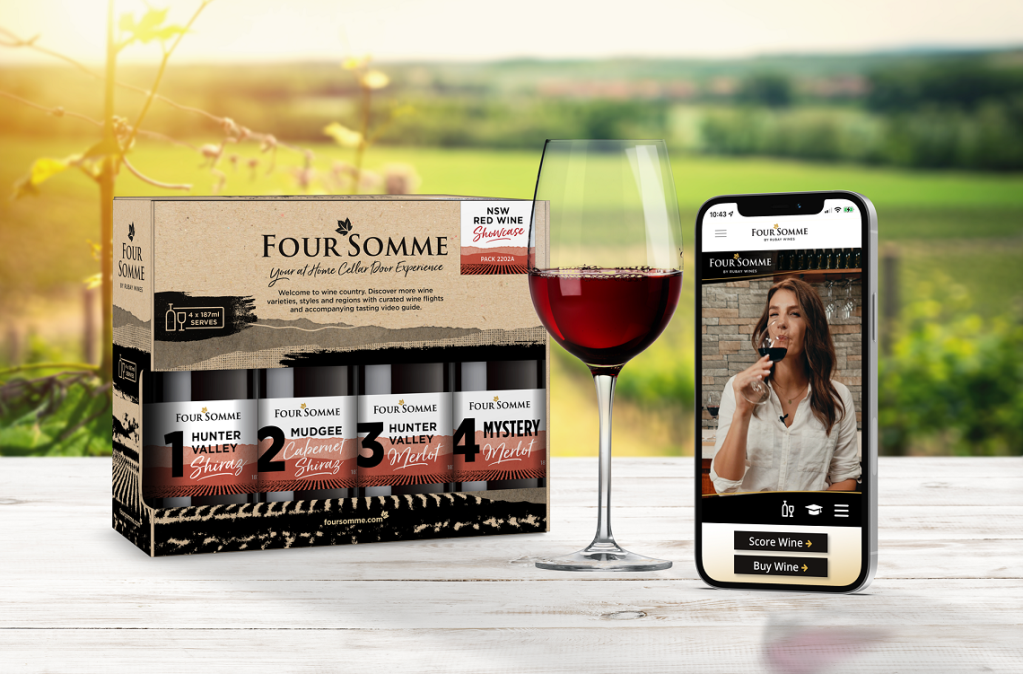Australian company Rubay Wines is aiming to shake up the world of wine industry data by using consumer feedback and artificial intelligence (AI) technology to predict customer preferences.
The recently launched company has created several programs that work together towards the goal of creating the most accurate set of insights for businesses in the wine sector, including liquor stores and wineries.
It all starts with the Four Somme wine club, a subscription program which sends customers a set of mini, plain labelled wines ahead of a scheduled delivery of full size wines. In this mini pack, consumers are only told the region and varietal of each wine, with the intention being that they should taste them blind before deciding what full size wines they want in their next subscription delivery.
These packs, sent for free with subscriptions, come with a QR code that directs customers to a program designed to replicate the cellar door experience, with sommelier videos guiding the tasting of the wines, and other educational videos to help teach consumers about wine. This program also directs customers to score and write notes about the wines they taste, which is gathered by Four Somme.
Rubay Wines takes that data and feeds it into its WineQ program, a sophisticated AI and consumer preferences technology created by Rubay specifically. WineQ uses the data to develop and train the AI to build profiles on which consumers like what wines and why. This goes beyond the usual profiling based on demographics, social and behavioural stats against usual classifications like varietal, region and vintage. Instead, it digs into the physical properties of each wine, from sugars, alcohol, acidity levels, tannins and chemical compound.

Co-founder, Avron Rubin, said Rubay Wines can give a far more accurate preference prediction with these programs, compared with other wine matching solutions. Wineries can use this to evolve their portfolio to meet customer demand. Then for retailers, WineQ can advise the best wines to stock in general, while also identifying gaps in a store’s current wine offering and how to fill them, all based on the specific elements of the store, its location and its customer base.
“We believe that by giving winemakers, consumers and retailers the opportunity to tap into this powerful data, winemaking can evolve to better align with consumer preferences, creating a more profitable system for winemakers and retailers, and making it easier for consumers to choose that perfect bottle, every time,” said Rubin.
“Choosing the right wine in a world of over 10,000 grape varieties presents a complex dilemma. Rubay’s goal is to ensure that, no matter where you sit in the wine sector, gone are the days of having to rely solely on subjective data and evaluations to make decisions on what wine to buy, sell or grow.”
According to Rubin, there is a “flaw in how people choose wine” at the moment. He said wine tastes can be very subjective, so the reason one person recommends a wine might be very different to the reason someone else does. For consumers who don’t know much about their palates, this can often lead them to buying a wine that isn’t really suited to their tastes, as the parameters for recommending a wine are too broad.
Rubin said that when people are deciding what wine to recommend, “they never ask what the sugar content is, what the acidity is, what the alcohol level is, or which chemical compounds are present. But these are the things that actually make the difference.
“What we do in our analysis is actually look at those elements of the wine, matched against the data and the research that we get from the people that are interacting with the wines.
“We believe one day, when there’s hundreds and thousands of tastings done, that we’ll be able to say a wine will be enjoyed by this exact person because of its specific chemical compound and particular structures. That data isn’t just based on the demographics, but by our algorithm understanding specifically what sort of wine a demographic will want in each category.”
Rubay’s approach to disrupt this world of wine data means that it has created a lot of its programs from scratch. This applies to its unique technology, but also other logistical elements of the company like its custom made in-house bottling facility that is designed to overcome integrity challenges common on typical small run micro bottling plants and the economical challenges of small runs at large contract bottlers.
For this facility, wineries send large bladders of their wine to Rubay, for freshness and sustainability. These bladders are connected to the automatic bottling plant that then creates the small sized bottles for the Four Somme packs, with HACCP approved processes. An on-site quality control laboratory ensures quality is maintained in the process, which also includes a range of advanced management systems and materials that set high standards for the end wines.
Having been in development for about two and a half years, Rubay Wines has big plans to build on the bespoke programs it has built and offer more value to the industry and consumers. This includes expansion into the US, competitions like guessing games about ‘mystery wines’, and using the Four Somme program’s technology for training purposes.

